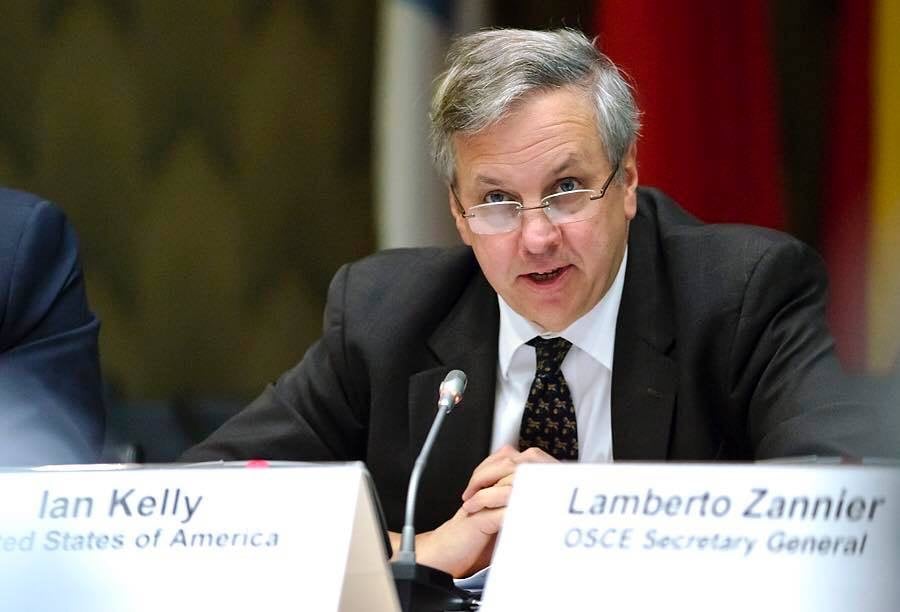Ambassador in Residence Ian Kelly has a rich history in public service. Before joining Northwestern in 2018, he served as a United States Ambassador to Georgia for three years. He also worked as a Department spokesperson for Secretary of State Hillary Clinton and an ambassador for the Organization for Security and Cooperation in Europe under the Obama Administration.
The Daily sat down with Kelly to talk about his career path and journey to NU.
This interview has been lightly edited for brevity and clarity.
The Daily: Could you tell me a little bit about what catalyzed your interest in international relations?
Kelly: While I was at Columbia (getting my PhD), I took a group of students to the Soviet Union for a year. This was 1983 or ’84 and it was a very tense moment in our relationship with the Soviet Union. We arrived just days after the Soviets shot down a Korean airliner, killing 269 people, including a U.S. congressman. I had to work very closely with the Foreign Service officers in Leningrad, now St. Petersburg, and got really interested in the work of the Foreign Service. That’s when I decided to switch from teaching Russian literature to a more hands-on job as a Foreign Service Officer.
The Daily: You were the American Ambassador to Georgia from 2015 to 2018. I’m curious what the role entailed and what some of the responsibilities of a U.S. foreign ambassador were.
Kelly: The first thing I think an ambassador needs to do is to develop a mission statement for the several hundred employees of a U.S. embassy. I think every ambassador says to protect the interests of the United States, in particular, the welfare of American citizens who are living in your host country.
The other part of (mine) was more specific to Georgia, and that was to support Georgia’s aspirations to join the EU and NATO. We had a very robust program of security cooperation and foreign assistance to support their economic and democratic reform program.
The Daily: Can you tell me a little bit about your role in the Organization for Security and Cooperation in Europe?
Kelly: That was 2010 to 2013 and came out of the Helsinki Process. As the name of the organization suggests, the Helsinki Process was a platform for enhancing security and cooperation between (the) East and West in the ’70s with the Warsaw Pact countries and with the Soviet Union.
With the collapse of the Soviet Union, it continued to be a platform for dialogue, but it also developed some programs of conflict management and resolution coming out of the fighting in Yugoslavia and the various conflict zones in the Soviet Union, one of which, of course, was Georgia, 20% of which is now under occupation by Russia, as is Ukraine.
The Daily: You were also a department spokesperson for Hillary Clinton. How did you pivot from working in the Foreign Service to working domestically?
Kelly: I was selected to be Secretary Clinton’s spokesman because of my background in dealing with the press. I had a few jobs as a press attache, dealing with both foreign and domestic press in Turkey, then in Italy and then finally at NATO.
The department spokesman’s job is more difficult because you have to conduct a daily press conference on record and on camera, and you have to be very, very careful not to say something provocative. The first month of that job was probably the highest stress period of my professional career. Like anything else, you get used to it, you get more comfortable with it.
The Daily: After having such a long career in politics, what drew you to working at Northwestern?
Kelly: I have ties with Northwestern. I got my master’s at Northwestern. I met my wife at Northwestern. Both my parents went to Northwestern. I wanted to settle here after the Foreign Service, but I did not want to retire.
I also felt like I had something that I could impart to your generation and that gave me a real sense of mission. I think it’s a mutually beneficial relationship for me and for the University.
The Daily: Do you think your political career has shaped your approach to teaching?
Kelly: Yes, of course. I think I look at (teaching) more from an international affairs and policy perspective, and I encourage my students to look at the issues and challenges of foreign policy. I encourage my students to look at it from a pragmatic perspective, to put themselves in the shoes of a policy practitioner. I would say that what sets me apart from a lot of my colleagues is this policy-oriented approach to looking at international affairs.
Email: gabehawkins2028@u.northwestern.edu
X: gabe19violin
Related Stories:
— Ambassador in Residence Ian Kelly discusses Putin, Russia-Ukraine crisis during Global Lunchbox
— Q&A: Prof. Paola Zamperini recounts her start in NU’s Department of Asian Languages and Cultures







